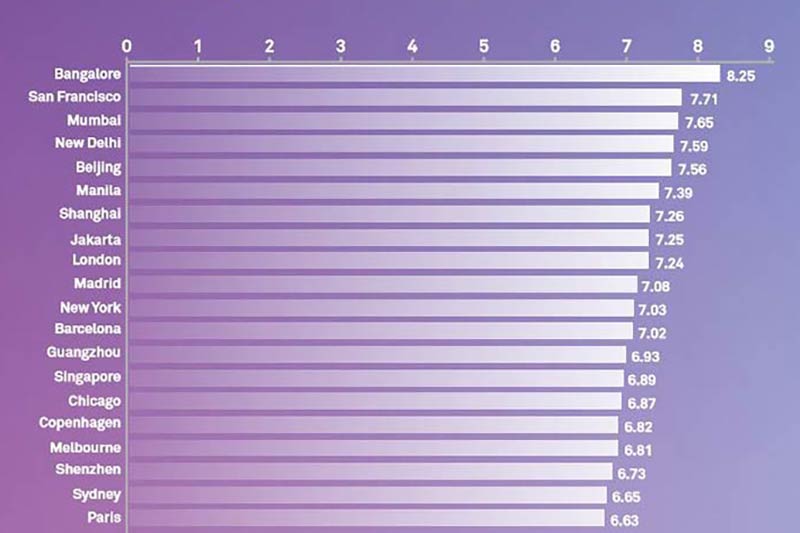
According to the Economist Intelligence Unit’s (EIU) Connecting
Commerce report, 8 Asian cities made it to the top 10 list in business
confidence in digital environment.
The EIU report was commissioned by Telstra. For the
fourth year, the report gauges business confidence in the digital environment
at a city level, as compared to most research that rank digital environments on
a state level.
Its Digital Cities Barometer ranked
45 cities across five key categories relevant to business performance: (1) innovation
and entrepreneurship, (2) financial environment, (3) people and skills, (4)
development of new technologies, and (5) ICT infrastructure.
The report assessed the
confidence of over 2,600 business executives in their city’s environment and
its conduciveness to supporting the digital ambitions of companies. It confirms the link between companies thriving
digital economies and the city environment that they locate in the location of
their business ecosystem. It provides unique insight into the global
digital transformation landscape, helping people understand how a city can
support an organisation’s digital transformation efforts.
The
following are its major findings:
Confidence in
the digital environment is high in Asia’s emerging market cities
Confidence in the digital
environment is high in Asia’s emerging market cities with Asian cities
occupying 8 out of the top 10 rankings. The 8 cities are: Bangalore (1st),
Mumbai (3rd), New Delhi (4th), Beijing (5th),
Manila (6th), Shanghai (7th), and Jakarta (8th).
However, developed cities in Asia
have recorded lower confidence. This is not to say that developed cities such
as Hong Kong and Tokyo are not providing a conducive environment for business
digital transformation. Rather, the high confidence in developing cities is
caused by the general optimism and enthusiasm towards the growth potentials in emerging
market cities.
Skill gaps as
a key challenge in digital transformation
A
key finding from the report is that skill gaps is among the two biggest
challenges that companies face in their digital transformation, along with
financial constraints. This indicates the local educational institutions must
make more efforts in nurturing and supplying digital talents.
In
terms of skill set, digital security and advanced data analytics are identified
as the two most critical skills needed for transformation, with softer skills
such as networking also a top priority.
The role of city governments and
authorities
According
to the EIU study, city governments and authorities directly influence digital
transformation in the private sector. Firms leverage open data made available
by governments to provide new and improved services to their customers. Nearly
70% of the surveyed executives consider open data to be important to their
businesses.
Governments
also play the role of a facilitator of information sharing on good
cybersecurity practices. This helps to address cybersecurity concerns in the
business sector, particularly with governments actively roll out smart city
initiatives. 63% of respondents say local authorities have consulted them on
cybersecurity issues at least occasionally in the past two years.
ICT infrastructure
build by the governments shape digital business environments. Shortcomings in
ICT infrastructure is named as a serious obstacle to achieving their digital
ambitions. Almost half of the survey sample believe that the city their firms
are in is ineffective in providing ICT infrastructure that meets firms’ digital
transformation needs.
There
is an observation that digital transformations create new roles. In recent years,
the role of Chief Technology Officer (CTO) has been created, usually sitting
alongside the chief Information Officer (CIO), to look after the city
government’s own technology infrastructure and often leads its Internet of
Things (IoT) initiatives. Chief Digital Officers (CDOs) are also beginning to
emerge to spearhead cities’ digital transformation efforts
Lastly,
the report also highlights that the success of a digital economy relies on the
strength and vibrancy of its digital business ecosystem. A strong digital economy ecosystem consists of support
from local authorities, market potentials, access to digital talent, the
possibility of digital partnership within the local ecosystem etc. Companies participate actively in formal and
informal local digital communities by turn to innovation labs and universities for
ideas, working with incubators and accelerators, then innovations thrive with
government support and conducive policies, eventually forming a strong digital
economy.
















